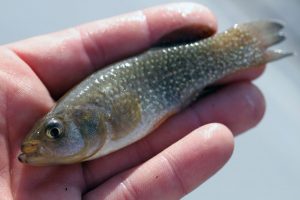Killifish – The “White Mouse” of Marine Science – in Gulf Oil Studies
– May 17, 2012
April 2012. Why would scientists select a small marsh minnow to help them understand the impacts of the Deepwater Horizon oil spill?
For starters, the Gulf killifish (Fundulus grandis) is a marsh-dependent, easy to catch, abundant fish that ranges across the Gulf of Mexico basin. These fish are small enough to handle easily but big enough for conducting tissue studies.
Killifishes are promising biosensors of aquatic pollution, and researchers can use them as a model species to understand environmental changes. Killifish could become the marine science equivalent of the white mouse used in medical science. – Dr. Stephen “Ash” Bullard, Auburn University
An important characteristic about killifish is they do not move around much (their populations remain largely separated). This means that killifish in Mississippi marshes do not routinely mix with killifish in Louisiana’s Barataria Bay – they have not travelled long distances or through other waters. Therefore, scientists can work from the assumption that if an area was exposed to oil, then so have the killifish that were captured from those oiled areas.
As an added benefit, scientists at the Virginia Institute of Marine Science have been studying the effects of oil on a closely-related species, the mummichog (Fundulus heteroclitus), which lives along the Atlantic coast. The killifish connection with mummichog offers the opportunity to draw on existing research and the potential for Gulf oil research to have implications for other places. All these factors contribute to scientists’ strategic selection of killifish as a model organism in marine science based on their biological attributes and distribution in nature.
The Gulf of Mexico Research Initiative (GOMRI) has funded five projects that involve killifish in their studies – three immediately after the oil spill and two follow-up a year later.
Year One studies included:
1) Detection of Impacts of DHOS-Related Hydrocarbon Dispersant Discharge in North Central Gulf of Mexico Estuaries Using Gulf Killifish Fundulus grandis as an Aquatic Vertebrate Sentinel – Drs. Stephen Bullard and Calvin Johnson (Auburn University) and Dr. Kristi Crowe (University of Alabama)
2) The Influence of Oil Dispersants on the Biodegradation of South Louisiana Crude Oil and the Resulting Toxicological, Molecular and Physiological Effects on the Gulf Killifish – Drs. Christopher Green, Fernando Galvez, and Andy Nyman (Louisiana State University) and Dr. Greg Mayer (Texas Tech University)
3) Analysis of the Effects of Crude Oil on Increased Disease Susceptibility and Physiological Responses of Selected Gulf of Mexico Fishes – Drs. Lora Petrie-Hanson and Peter J. Allen (Mississippi State University)
Follow-up studies included:
4) Sampling for Reproductive and Developmental Recovery in Fish from the Gulf of Mexico One Year After Exposure to BP Oil/Dispersants – Dr. James A. Carr, Deborah L. Car, and Earnest E. Smith (Texas Tech University) and Dr. Arunthavarani Thiyagarajah (Tulane University)
5) Emergency Funds to Continue Monitoring DHOS Effects within a Heavily-Oiled Gulf of Mexico Salt Marsh – Barataria Bay, Louisiana – Drs. Stephen Bullard and Covadonga R. Arias (Auburn University) with Michael A. Unger (Virginia Institute of Marine Science)
This research was made possible by a grant from BP/The Gulf of Mexico Research Initiative. The GoMRI is a 10-year, $500 million independent research program established by an agreement between BP and the Gulf of Mexico Alliance to study the effects of the Deepwater Horizon incident and the potential associated impact of this and similar incidents on the environment and public health.
© Copyright 2010- 2017 Gulf of Mexico Research Initiative (GoMRI) – All Rights Reserved. Redistribution is encouraged with acknowledgement to the Gulf of Mexico Research Initiative (GoMRI). Please credit images and/or videos as done in each article. Questions? Contact web-content editor Nilde “Maggie” Dannreuther, Northern Gulf Institute, Mississippi State University (maggied@ngi.msstate.edu).






